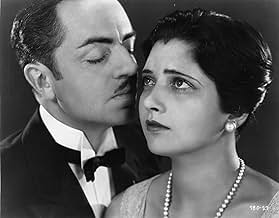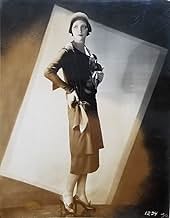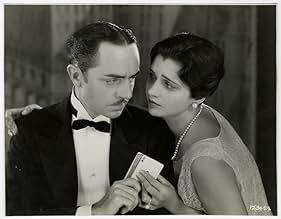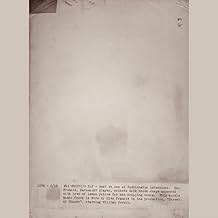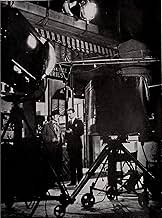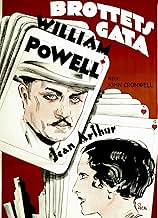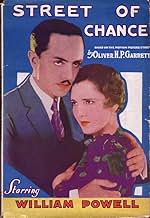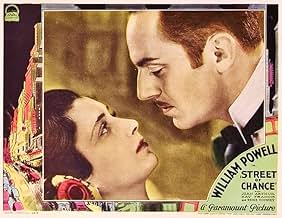Aggiungi una trama nella tua linguaA big-time, but honest gambler has to prevent his younger brother from following in his footsteps, and taking up gambling.A big-time, but honest gambler has to prevent his younger brother from following in his footsteps, and taking up gambling.A big-time, but honest gambler has to prevent his younger brother from following in his footsteps, and taking up gambling.
- Regia
- Sceneggiatura
- Star
- Candidato a 1 Oscar
- 3 vittorie e 1 candidatura in totale
Oscar Apfel
- Bartender
- (non citato nei titoli originali)
G. Pat Collins
- Police officer
- (non citato nei titoli originali)
John Cromwell
- Imbrie
- (non citato nei titoli originali)
Gordon De Main
- Gambler
- (non citato nei titoli originali)
Jack Luden
- Holland House Hotel Clerk
- (non citato nei titoli originali)
William H. O'Brien
- Waiter
- (non citato nei titoli originali)
Broderick O'Farrell
- Gambler
- (non citato nei titoli originali)
Recensioni in evidenza
This was quite enjoyable on a few levels. The lead actors in general has good strong performances, with Kay Francis having a few bad scenes. I blame the director for choosing those because other scene with her were totally believable. At first the story seemed a little confusing but quickly was understandable. A couple favorite scenes of mine were where William Powell finishes talking to Kay Francis and then walks out. Most films of the time would have cut the moment he walked out, but the camera kept rolling and we saw Francis slump down in dispare. The other favorite was the top down card scene towards the end. Overall, I would mainly recommend this to fans of the Thin Man series or other serious "black and white fans." It's definitely a hidden gem.
When, many moons ago, I interviewed director John Cromwell for an article I was preparing on the first big gangster-film star of the late Twenties/early Thirties, George Bancroft, I mentioned STREET OF CHANCE (Paramount; 1930) to him as an aside, it not containing Bancroft. His initial response was to confuse its genesis with gambler Nicky Arnstein, who, if I recall correctly, was married to Fannie Brice; but upon my putting forth Arnold Rothstein as the more likely source, he agreed. Arnstein was a gambler and apparent scoundrel; Rothstein also a gambler albeit far more notorious, infamously credited with having fixed a baseball World Series; his shooting death in 1928 was never solved. In STREET OF CHANCE, the shooting of the William Powell gambler is implied without being shown; his dying words, given in an ambulance rushing him to a hospital in response to an attendant's bet that he'll live, signals the film's final fadeout, these being, "You lose." When I complimented the director on this powerful, yet understated finale, he modestly responded something like, "Well, that's the kind of thing we were trying to do then." If, as John implied, such creativity was the order of the day, I've seen scant examples worthy of this one! Paramount remade the film in 1937 as HER HUSBAND LIES, starring Ricardo Cortez as the ill-fated gambler. A good little film, but lacking the tour-de-force quality engendered by the original which, sad to say, is a virtually forgotten motion picture.
Regards, Ray Cabana, Jr.
Regards, Ray Cabana, Jr.
In watching the early Paramount talkies with William Powell it never ceases to amaze that Powell stage trained voice that he had apparently knew instinctively how to modulate for the new medium of talking motion pictures. It was why he was able to have three successful Philo Vance films and Street Of Chance is in the same mode.
Powell's character of 'Natural' Davis is of course modeled on the legendary Arnold Rothstein who gambled with quite a bit more than just games of chance. This is the life Powell has chosen for himself and he and wife Kay Francis are content. He's the best at what he does in a business filled with uncertainty.
But this is not a life he wants for his brother Regis Toomey who comes into town wanting to try the gambling world and be the best like 'Natural Davis. That's not what Powell wants for his kid brother, he wants Toomey to be and stay respectable. Tragedy results when Powell tries some desperate means to keep Toomey from the life.
Powell and Francis are at the top of their game and Toomey registers well as the eager younger brother. Jean Arthur is here as well, but she's really not the Jean Arthur who developed later on in those Thirties screwball comedies, she took quite a while to develop as a screen personality.
Street Of Chance shows William Powell at really good advantage in a carefully delineated role. For his fans definitely catch this one.
Powell's character of 'Natural' Davis is of course modeled on the legendary Arnold Rothstein who gambled with quite a bit more than just games of chance. This is the life Powell has chosen for himself and he and wife Kay Francis are content. He's the best at what he does in a business filled with uncertainty.
But this is not a life he wants for his brother Regis Toomey who comes into town wanting to try the gambling world and be the best like 'Natural Davis. That's not what Powell wants for his kid brother, he wants Toomey to be and stay respectable. Tragedy results when Powell tries some desperate means to keep Toomey from the life.
Powell and Francis are at the top of their game and Toomey registers well as the eager younger brother. Jean Arthur is here as well, but she's really not the Jean Arthur who developed later on in those Thirties screwball comedies, she took quite a while to develop as a screen personality.
Street Of Chance shows William Powell at really good advantage in a carefully delineated role. For his fans definitely catch this one.
William Powell is on the "Street of Chance" in this 1930 film also starring Kay Francis, Jean Arthur, and Regis Toomey.
I will admit right off that I did not recognize either Arthur or Toomey in this film.
Powell plays "Natural" Davis, a character modeled on the famed gambler Arnold Rothstein. The film portrays a couple of incidents in Rothstein's life, but in my opinion, the character is very loosely based on Rothstein.
Natural Davis is a professional gambler, and as a result, his wife Alma (Kay Francis) is divorcing him. He begs her to stay with him, eventually promising her that he will not only quit gambling, but go away with her on an extended trip..
When is brother Babe (Toomey) comes to town, Natural learns that his wedding gift of $10,000 has been spent gambling. Babe is a big winner and now has $50,000. He's in New York to gamble for $100,000 more so he can buy into a partnership.
Let me pause for a minute. The amounts of money these people are talking about are unbelievable. In 1930, $100,000 was 1,611,946.11 in today's money! Usually in films people are robbing banks for $5,000 or trying to get $50 from someone.
To continue - Natural does not want his brother to pursue the life of a gambler, so he's determined to make sure Babe is cleaned out. He arranges for his associates to help him, joining Babe in a game. It doesn't quite work out as he hoped. In a bind, he has to break his promise to Alma temporarily, but she doesn't buy it.
Powell is natural and very effective, and the film moves quickly, with people picking up their dialogue cues. Often in early talkies, actors were still adjusting to sound. As a result you get pauses between lines of dialogue, and, because of stage training, big gestures and loud voices. Powell has none of this. He's tough yet elegant and sympathetic yet ruthless.
Francis doesn't have much to do as Natural's suffering wife, but she's very good. The rest of the acting is fine, but you could have knocked me over with a feather when I learned that Babe was Regis Toomey and his wife was Jean Arthur! Arthur had none of the characteristics she later developed. Here, she's pure ingenue.
One of the most interesting things about these precode films is that because there is no Hayes code, the ending is not predictable as it is in many later films. The end of this kind of surprised me.
I will admit right off that I did not recognize either Arthur or Toomey in this film.
Powell plays "Natural" Davis, a character modeled on the famed gambler Arnold Rothstein. The film portrays a couple of incidents in Rothstein's life, but in my opinion, the character is very loosely based on Rothstein.
Natural Davis is a professional gambler, and as a result, his wife Alma (Kay Francis) is divorcing him. He begs her to stay with him, eventually promising her that he will not only quit gambling, but go away with her on an extended trip..
When is brother Babe (Toomey) comes to town, Natural learns that his wedding gift of $10,000 has been spent gambling. Babe is a big winner and now has $50,000. He's in New York to gamble for $100,000 more so he can buy into a partnership.
Let me pause for a minute. The amounts of money these people are talking about are unbelievable. In 1930, $100,000 was 1,611,946.11 in today's money! Usually in films people are robbing banks for $5,000 or trying to get $50 from someone.
To continue - Natural does not want his brother to pursue the life of a gambler, so he's determined to make sure Babe is cleaned out. He arranges for his associates to help him, joining Babe in a game. It doesn't quite work out as he hoped. In a bind, he has to break his promise to Alma temporarily, but she doesn't buy it.
Powell is natural and very effective, and the film moves quickly, with people picking up their dialogue cues. Often in early talkies, actors were still adjusting to sound. As a result you get pauses between lines of dialogue, and, because of stage training, big gestures and loud voices. Powell has none of this. He's tough yet elegant and sympathetic yet ruthless.
Francis doesn't have much to do as Natural's suffering wife, but she's very good. The rest of the acting is fine, but you could have knocked me over with a feather when I learned that Babe was Regis Toomey and his wife was Jean Arthur! Arthur had none of the characteristics she later developed. Here, she's pure ingenue.
One of the most interesting things about these precode films is that because there is no Hayes code, the ending is not predictable as it is in many later films. The end of this kind of surprised me.
In this film, the always debonair William Powell plays a businessman leading a double life as "Natural" Davis, an elite gambler with a penchant for winning because he "knows the percentages." He deals with gangsters and can summon up toughness when he needs to, but he also has personal integrity and treats people with fairness, at least, per his world's code. He's thus another example the common (and rather dubious) film trope of a guy who's operating outside the law, but lives by a moral code and is established as virtuous anyway. Here that's somehow true even when we see him order another gambler to be murdered because he's caught him stealing from him. Naturally, the violence isn't depicted.
Trouble comes to Natural Davis in two forms: (1) his wife (Kay Francis) is fed up with his late nights and threatens to call it quits, and (2) his little brother (Regis Toomey) comes to town looking to gamble himself, not knowing that the legendary Natural Davis is his own brother. Natural tries to do the right thing on both fronts, that is, to make drastic changes to preserve his marriage, and to attempt to dissuade his brother from the sordid life of gambling. His idea is a little trickery to do the latter, leading to a pretty fine scene of the brothers in a high stakes poker game together.
The film is certainly stronger towards the end, but it's a little mechanical getting there, stretching its simplistic plot out to fill the runtime. It's not clear how this nominated for a Best Writing Oscar, but 1930 was not a particularly strong year for films, with filmmakers still adapting to sound (the following years up to the end of the pre-Code era are certainly better). Regardless, from where I sit, Kay Francis and Jean Arthur (who plays the brother's wife) were largely wasted, their characters mostly just planets in orbit around Powell's. There is drama leading to a great final line from Powell, but the story line for the brother was unsatisfactory because it seemed far too tidy (wow, cured just like that, despite the temptation on the train!).
With that said, the film is worth seeing if you're a fan of the stars, and there were also various little things from the era that caught my eye. Mostly these are shots in New York, including the light streaming through the windows of Grand Central Station, and the big billboards for James J. Walker, a Tammany Hall mayor who was forced to resign a couple of years later. I also liked the neon sign advertising Spider-Web Hosiery in the background of the scene Powell has with Arthur. Lastly, it was interesting to see the swastika on some of the poker chips, but while the Nazis had already appropriated the symbol by this time, it appears these types of chips had been made for decades in America, and mercifully no fascist sympathies were being subtly expressed.
Trouble comes to Natural Davis in two forms: (1) his wife (Kay Francis) is fed up with his late nights and threatens to call it quits, and (2) his little brother (Regis Toomey) comes to town looking to gamble himself, not knowing that the legendary Natural Davis is his own brother. Natural tries to do the right thing on both fronts, that is, to make drastic changes to preserve his marriage, and to attempt to dissuade his brother from the sordid life of gambling. His idea is a little trickery to do the latter, leading to a pretty fine scene of the brothers in a high stakes poker game together.
The film is certainly stronger towards the end, but it's a little mechanical getting there, stretching its simplistic plot out to fill the runtime. It's not clear how this nominated for a Best Writing Oscar, but 1930 was not a particularly strong year for films, with filmmakers still adapting to sound (the following years up to the end of the pre-Code era are certainly better). Regardless, from where I sit, Kay Francis and Jean Arthur (who plays the brother's wife) were largely wasted, their characters mostly just planets in orbit around Powell's. There is drama leading to a great final line from Powell, but the story line for the brother was unsatisfactory because it seemed far too tidy (wow, cured just like that, despite the temptation on the train!).
With that said, the film is worth seeing if you're a fan of the stars, and there were also various little things from the era that caught my eye. Mostly these are shots in New York, including the light streaming through the windows of Grand Central Station, and the big billboards for James J. Walker, a Tammany Hall mayor who was forced to resign a couple of years later. I also liked the neon sign advertising Spider-Web Hosiery in the background of the scene Powell has with Arthur. Lastly, it was interesting to see the swastika on some of the poker chips, but while the Nazis had already appropriated the symbol by this time, it appears these types of chips had been made for decades in America, and mercifully no fascist sympathies were being subtly expressed.
Lo sapevi?
- QuizThe Alfred Hitchcock Hour (1962-1965) remade this story under the title of "A Piece of the Action" starring Gig Young and Robert Redford. It was the premier program of the show.
- ConnessioniFeatured in David O. Selznick: 'Your New Producer' (1935)
I più visti
Accedi per valutare e creare un elenco di titoli salvati per ottenere consigli personalizzati
- How long is Street of Chance?Powered by Alexa
Dettagli
- Data di uscita
- Paese di origine
- Lingua
- Celebre anche come
- Brottets gata
- Luoghi delle riprese
- Azienda produttrice
- Vedi altri crediti dell’azienda su IMDbPro
- Tempo di esecuzione1 ora 15 minuti
- Colore
- Proporzioni
- 1.20 : 1
Contribuisci a questa pagina
Suggerisci una modifica o aggiungi i contenuti mancanti

